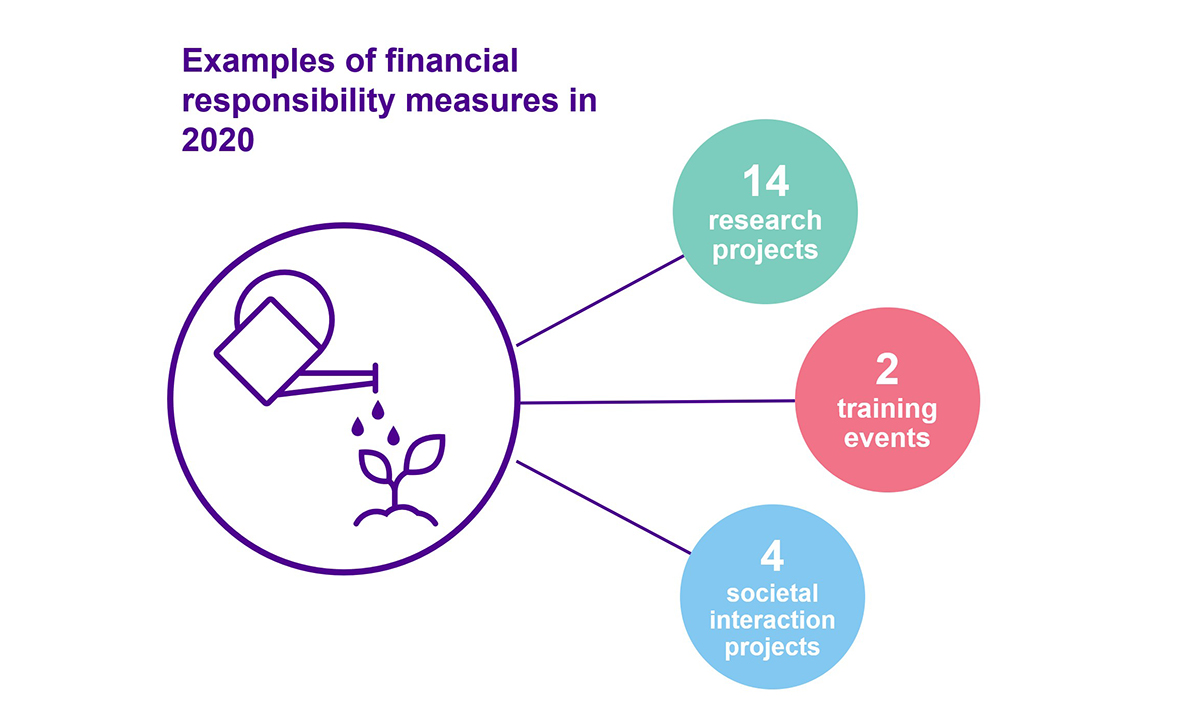
SDG 2 ZERO HUNGER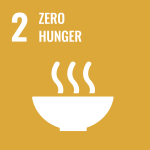
Tampere University explores innovations for reducing food loss
Wastebusters, a research group based in the Faculty of Management and Business at Tampere University, is involved in the international LOWINFOOD project launched in 2020. The goal of the project is to work together with stakeholders in the food supply chain to co-design low-waste value chains by supporting the demonstration of a portfolio of innovations for the fruits & vegetables, bakery products and fish value chains as well as for at-home and out-of-home consumption.
The four-year project is funded by the European Union’s Horizon 2020 programme and involves 27 partners from 12 European countries.
Read more about the LOWINFOOD project.
SDG 3 GOOD HEALTH AND WELL-BEING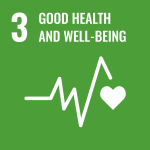
Projects develops ground rules for marketing food to children
The EPELI project conducted between 2020 and 2021 explored the marketing of unhealthy foods to children. The project looked into the marketing of food to children and young people and the criteria for defining unhealthy food and proposed ways to protect children and young people from unhealthy food marketing.
The project brought together researchers specialising in nutrition, marketing, consumer research and the law. The project involved researchers from the University of Helsinki, Tampere University and the Finnish Environment Institute (SYKE).
The research was funded by the Finnish Prime Minister’s Office.
Read more about the EPELI project (in Finnish).
SDG 8 DECENT WORK AND ECONOMIC GROWTH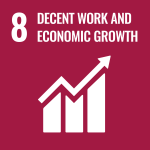
Business collaboration to boost smart sales
In the ROBINS project, sales operations are automated with the help of intelligent robotics, which will enable sales and marketing expertise to be utilised by SMEs to promote their growth and internationalisation. The project develops scalable solutions and models utilising B2B sales robotics, which will support the transition to an open and intelligent marketing ecosystem.
The project is a collaborative effort between Tampere Universities and six Finnish companies.
Read more about the Robins project (in Finnish).
SDG 9 INDUSTRY, INNOVATION AND INFRASTRUCTURE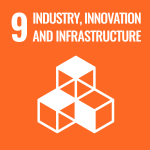
Study reveals the power of change agents in breaking circular economy barriers
Launched in 2020, the Waste Matters — Change Agents in the Breaking of the Circular Economy project analyses how change agents participate and engage in the transition towards circular economy (CE) business ecosystems.
The project focuses specifically on consumer citizens, consumer communities and start-ups with the desire and opportunity to transform business ecosystems into more sustainable ones.
Read more about the Waste Matters project.
International project supports cities in the implementation of sustainable construction practices
Circular Construction in Regenerative Cities (CIRCuIT) is a collaborative project seeking to develop and test innovative solutions for implementing a closed-loop system in urban environments so that today’s products become tomorrow’s raw materials. The project participants take a holistic look at the value chain of construction, which includes urban designers, property owners and developers, architects, construction companies and demolition companies.
The project has received funding under the EU’s Horizon 2020 programme and involves 31 partners located in Copenhagen, Hamburg, Helsinki and Greater London.
Read more about the ReCreate project.
Research to develop climate-positive industrial areas
The objective of the Climate-Positive Industrial Areas and Value Chains (CircHubs ILPO) project is to support cities in reaching their ambitious climate goals. The project incorporates companies’ value chains and circular economy hubs into climate efforts that require input from all stakeholders in society.
The project is looking to help companies find new low-emissions solutions and collaboration models for sequestering carbon, create carbon roadmaps for circular economy hubs, and generate internationally interesting reference sites for climate-positive industrial areas.
CircHubs ILPO is a part of the Six City Strategy where the cities of Helsinki, Espoo, Vantaa, Tampere, Turku and Oulu tackle challenges of urbanisation and develop better services.
Read more about the ILPO project.
Tampere University participated in solving the zero fibre challenge
The CircVol project that ended in late 2020 was carried out to support the growth of new business based on a circular economy and look into the utilisation of large-volume industrial side streams and masses of soil generated from infrastructure construction. The participants mapped out the digital solutions and interfaces with the potential to facilitate the utilisation of excavated soil and speed up the development of circular economy hubs.
Tampere University participated in a local challenge that examined how zero fibre, meaning surplus wood from the pulp industry, which is lying at the bottom of Lake Näsijärvi in Tampere could be recovered and utilised.
Read more about the CircVol project.
SDG 11 SUSTAINABLE CITIES AND COMMUNITIES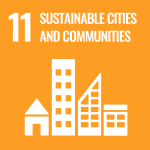
Researchers develop resource-wise housing concepts
The project titled Low Impact, Low Energy Housing and Neighbourhoods in the Häme Region was launched to co-create tools and ideas for developing appealing housing concepts and environments for the municipalities located in the Häme region, Finland, which can then utilise the tools in their strategic development.
The project and the housing concepts place a special emphasis on sustainable development, resource-efficiency, carbon neutrality, energy efficiency and social sustainability with the aim of promoting holistic regional development and the success of small municipalities in Finland, both now and in the future.
Developing public services from a customer perspective to promote sustainability
In 2020, Kimmo Sulonen completed a doctoral dissertation where he examined the development of public cadastral procedures from a customer-oriented perspective. The development of public services to better meet customer needs can not only improve efficiency but also ensure that plans are carried through and that resources are not lost or wasted.
Collaborative project supports Finland’s transition to a circular economy
Circular Economy Catalysts: From Innovation to Business Ecosystems (CICAT2025) is a collaborative undertaking between Finnish universities that aims to facilitate the transition from linear to circular economy. The project supports Finland’s mission to become a global forerunner in circular economy by 2025 by identifying factors that promote and accelerate the transition to a circular economy and looking for solutions that will enable companies and decision-makers to promote this transition.
The consortium consists of Tampere University, the University of Turku, the University of Jyväskylä, the University of Eastern Finland, Tampere University of Applied Sciences and Turku University of Applied Sciences. The project is funded by the Strategic Research Council of the Academy of Finland.
Multidisciplinary research speeds up the adoption of circular economy practices
The University Platform for Circular Economy (UPCE) is a multidisciplinary profiling initiative that focuses on the utilisation of living lab platforms to promote circular economy in urban centres. At Tampere University, the project involves researchers from the Environmental Technology unit, Industrial Engineering and Management unit, Aerosol Physics unit and Environmental Policy unit.
A special focus is placed on the living labs in the Hiedanranta district in Tampere and, in particular, the nutrient cycle. The mission is to accelerate the transition to a sustainable circular economy with the help of a multidisciplinary approach.
The team of researchers examines the impact and activities of various stakeholders in the living labs from the perspectives of technology development and implementation, the organisation of multi-stakeholder collaboration, and business.
Read more about the University Platform for Circular Economy.
SDG 12 RESPONSIBLE CONSUMPTION AND PRODUCTION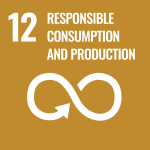
Company collaboration creates new business opportunities based on recycled plastic
The PLASTin – ALL‐IN for Plastics Recycling project was established to support the plastic industry in developing systemic and environmentally optimised recycling concepts. This can be achieved by generating new knowledge about recycling processes and technologies, such as sorting, pre‐treatment, mechanical and chemical treatment and reject handling, and building a system‐level understanding to uncover new business opportunities that are based on recycling.
In addition to Tampere University, the project includes researchers from other Finnish universities and research institutes as well as several companies. The project is funded by Business Finland.
Collaborative project explores new business opportunities opened up by circular economy
CircHubs 6Aika: Future Circular Economy Hubs in Finland was a collaborative project that ended in 2019. The goal of the project was to not only identify new business opportunities emerging from the transition to a circular economy but also support the commercialisation of circular economy innovations in the six largest cities in Finland. The project produced information about material flows, potential new business opportunities and utilisation possibilities.
The innovation and technology research group CITER from the Industrial Economy unit at Tampere University took part in the project. The research group will apply the knowledge generated in the CircHubs project in its ongoing projects exploring circular economy.
Article explores the relationship between circular economy and sustainable development
A conference article published by researchers at Tampere University (Salminen, H., Marjamaa, M., Tapaninaho, R., Heikkinen, A., Gonzalez Porras, L. & Kujala, J. 2020., How do stakeholders understand sustainable circular economy – consensus or contradictions?) investigates how circular economy and its linkages to sustainability are understood among key stakeholders involved in the promotion of circular economy in Finland.
This study is a part of CICAT2025 Circular Economy Catalysts: From Innovation to Business Ecosystems research project, which is funded by the Strategic Research Council of the Academy of Finland.
Read more about the CICAT2025 working group’s article.
Publications on sustainable consumerism
The Wastebusters research group at Tampere University studies how different economic actors, including consumers, consumption communities, companies and other organizations, can participate in solving wicked problems such as food waste and the growing amount of waste in society. The group includes researchers specialising in marketing, management and sociology. The group publishes research findings in scientific journals in the fields of business studies and social sciences and participates in public discussion on food waste, circular economy and sustainable development.
In 2020, the research group published two scientific papers on sustainable consumption.
Find out more about the publications of the Wastebusters research group (in Finnish).
SDG 13 CLIMATE ACTION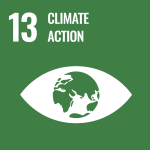
Students envision a new sustainable development forum for companies
In February 2020, the University Consortium of Pori (UCPori) organised a hackathon where students studying information and knowledge management designed a sustainable and affordable solution for sharing information about sustainable development to SMEs located in the surrounding Satakunta region.
The hackathon was organised in cooperation with the Sustainable Development in Micro, Small and Medium-Sized Companies (Kekeos) project and local companies. The jury consisted of local entrepreneurs.
The Kekeos project carried out in 2017–2020 supported local companies in broadening their employees’ competencies with the aim of promoting sustainable development, resource efficiency and transition to a low-carbon circular economy.
Read more about the Kekeos project (in Finnish).
SDG 15 LIFE ON LAND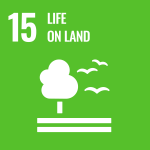
The B2N project promotes company participation in the production of sustainable ecosystem services
B2N Business to Nature: Stakeholder-driven Value Creation in Ecosystem Services is an interdisciplinary study that addresses the question of how businesses can contribute to the generation of ecosystem services. Bridging the domains of stakeholder theory and ecosystem services research, the project aims to supplement the view of “business from nature” with the view of “business to nature” (B2N). The hypothesis is that relational value creation has significant potential to promote sustainability.
Read more about the B2N project.
SDG 17 PARTNERSHIPS FOR THE GOALS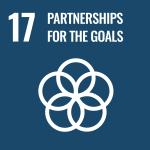
Innovation challenges to support sustainable entrepreneurship
HUBS (formerly called Y campus) offers courses and modules on entrepreneurship at Tampere Universities. In the 2020 summer semester, HUBS organised a rethought version of its Innovation Challenges course, which for the first time focused on sustainable development. The course was offered to support students affected by the Covid-19 pandemic as many found themselves in a situation where their summer job or internship was suddenly cancelled.
Students attending the Innovation Challenges course are tasked with finding solutions to a set of challenges pertaining to society and the world of work. The course enables students to develop their innovative thinking skills and promote sustainable development. During the course, students work together with external organisations that provide the assignments.
HUBS offers sustainable entrepreneurship studies, tools and sparring for students at Tampere University and Tampere University of Applied Sciences.
Read more about the HUBS Innovation Challenges.
Tampere University is promoting for environmental responsibility for the plastic industry
The University of Tampere is participating in the Composite Division operated by Plastic Industries ry. The university’s representative on the Board of Directors is Mikko Kanerva, professor of materials studies.
The Composite Division acts as a collaborative body for the plastics industry. It promotes networking, monitors the development and standardisation of environmental issues and technology in the field, and aims to influence their content.
The division promotes training and research in the field, conducts joint projects and works to develop the general playing field for the sector.
Development of the ECO3 business area involves multiple partners
ECO3 is an innovative, industrial-scale, multidisciplinary bio- and circular economy business area that is being built in Kolmenkulma Eco-Industrial Park in Nokia, Finland. Tampere University has been involved in the ECO3 project ever since its launch in 2014. Led by Professor of Industrial Management Marko Seppänen, researchers have already conducted two separate projects relating to the development of the ECO3 concept.
Up until now, the research carried out in the ECO3 area has largely focused on the development of technology and the materials and mechanisms relating to a circular economy. In the future, research can also be carried out to investigate, for example, the social impact of the area to utilise the University’s expertise in social sciences.
For Tampere University, ECO3 provides a framework for long-term collaboration so the development of the concept has continued even after companies set up shop in the business area. Once the companies have their processes fully up and running, they can, for example, offer work placements to students working on their thesis who can develop the processes further.
